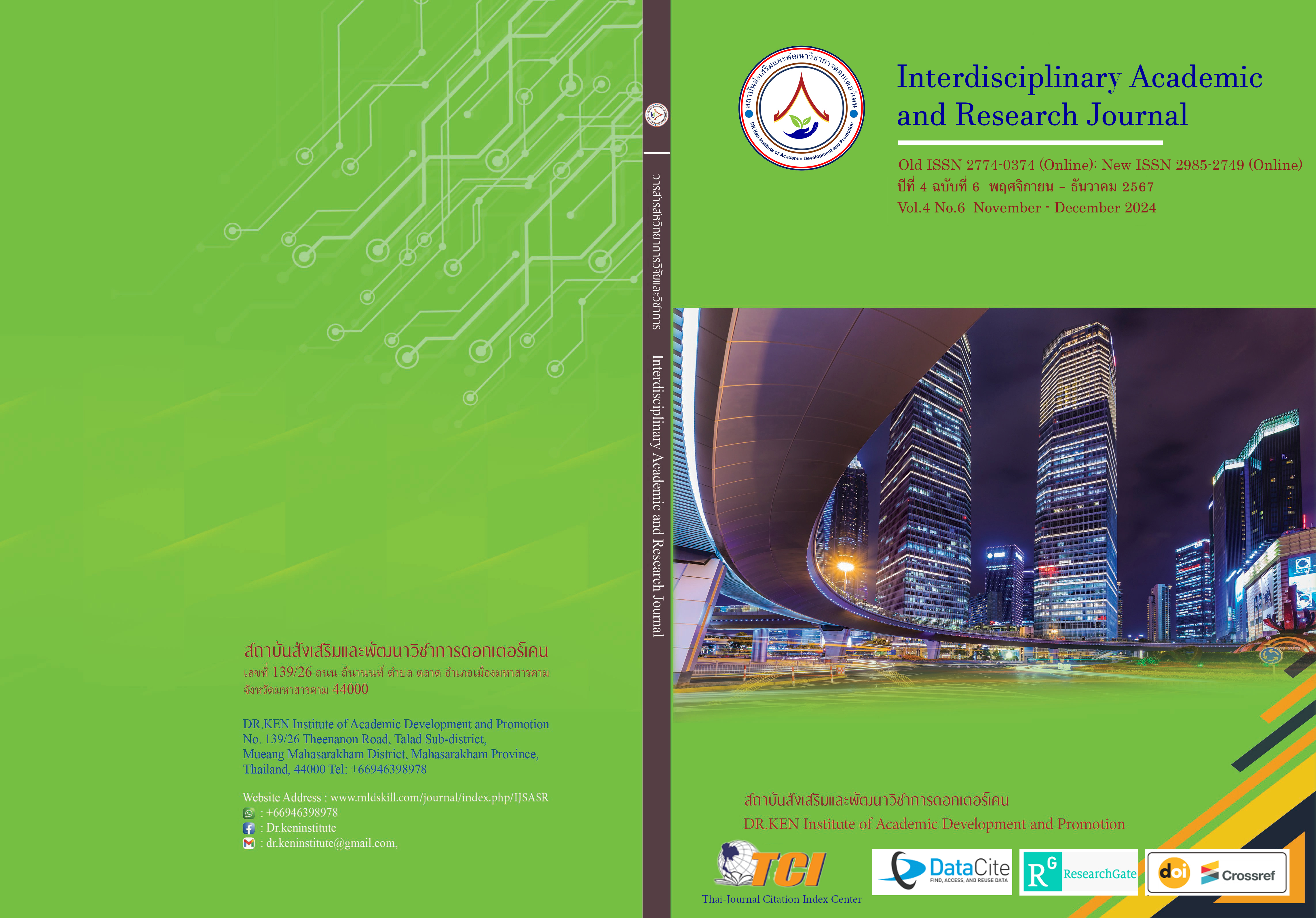The Development Guidelines for Good Citizenship Characteristics for Secondary Level Students in Educational Opportunity Expansion Schools under the Mahasarakham Primary Educational Service Area 2
DOI:
https://doi.org/10.60027/iarj.2024.279999Keywords:
Development Guidelines, Good Citizenship, Junior High School StudentsAbstract
Background and Aims: Education plays a crucial role in developing good citizenship qualities in students at all levels because educational institutions are social institutions that help cultivate good citizens. Generally, the emphasis is on developing the nation's children and youth to be good citizens and capable of adapting to the changes occurring in society. Therefore, this research aims to study the current desirable state and the priority need of good citizenship characteristics for secondary-level students and to study the development guidelines for good citizenship characteristics for secondary-level students in educational opportunity expansion schools under the office of Maha Sarakham primary educational service area 2.
Methodology: The research procedures were divided into two phases. The first stage was to study the current desirable state and the priority need of good citizenship characteristics for secondary-level students, The sample group consists of 253 individuals, comprising 48 school administrators and 205 teachers, by stratified random sampling. The current condition has a confidence value of 0.93. The discriminant power ranges from 0.29 – 0.76. The statistics used for data were analyzed by mean, and standard deviation. The second stage was the study of the guidelines for developing good citizenship characteristics for secondary-level students in educational opportunity expansion schools under the office of Maha Sarakham primary educational service area 2. The Key informants for studying the guidelines included 6 individuals, and a group of 7 experts was involved in evaluating the guidelines. The tools used in the research were interviews and assessment forms to evaluate the suitability and feasibility of the development guidelines.
Results: 1. The current state overall was high average and the desirable state overall was in the highest level. The priority needs ranked from high to low level were 1) respect the rules 2) respect the rights of others 3) responsibility 4) morality and ethics. 2. the development guidelines for good citizenship characteristics for secondary level students were 21 guidelines as follows: 1) respect the rules 3 guidelines 2) respect the rights of others 3 guidelines 3) responsibility 3 guidelines and 4) morality and ethics 5 guidelines. The results of evaluating the suitability and feasibility of the overall approach were at the highest level.
Conclusion: Good citizenship characteristics for lower secondary school students are attributes that reflect students' knowledge, understanding, thoughts or attitudes, and conduct towards themselves and others. These include social responsibility and respect for others under the democratic system, possessing moral and ethical values, being proud of their Thai identity, and respecting laws and social norms of the community, locality, and educational institutions. Additionally, it includes demonstrating public-spiritedness, discipline, self-responsibility, respect for diversity and others' rights, and a clear understanding of their rights and duties. The components are as follows: 1)Respect the rules 2) Respecting the rights of others 3) Responsibility and 4) Morality and Ethics.
References
กระทรวงศึกษาธิการ. (2551). การจัดการศึกษาเพื่อความเป็นพลเมือง. Retrieved on January 3, 2021 from: www.moe.go.th/moe/upload/news20/FileUpload/21432- 6446.pdf.
เกรียงศักดิ์ เจริญวงศ์ศักดิ์ (2559). ภาคประชาชนเข้มแข็งเมื่อประชาชนเป็น "พลเมือง". กรุงเทพฯ: สถาบันอนาคตศึกษาเพื่อการพัฒนา (IFD).
คณะกรรมการเสริมสร้างความเป็นพลเมืองในระบอบประชาธิปไตยตามวิถีรัฐธรรมนูญ. (2559). การถอดบทเรียน “แบบอย่างที่ดีในการเสริมสร้างความเป็นพลเมือง : มิติในประเทศและมิติของอาเซียน. กรุงเทพฯ : สำนักงานเลขาธิการสภาผู้แทนราษฎร.
ชัยยศ จินารัตน์. (2565). แนวทางการพัฒนาปัจจัยองค์ประกอบความเป็นพลเมืองดีให้มีผลต่อประชาสังคมแนวใหม่. วารสารพุทธปรัชญาวิวัฒน์. 6 (2), 241-252.
ธงชัย สมบูรณ์. (2562). รัฐชาติ : การศึกษาและการสร้างความเป็นพลเมืองที่ดี. วารสารครุศาสตร์ คณะครุศาสตร์ มหาวิทยาลัยนครพนม.วารสารครุศาสตร์ คณะครุศาสตร์ มหาวิทยาลัยนครพนม. 1 (1), 9-14.
ธัญธัช วิภัติภูมิประเทศ. (2556). ความเป็นพลเมืองในระบอบประชาธิปไตยของนักศึกษามหาวิทยาลัยธุรกิจบัณฑิตย์. กรุงเทพฯ : มหาวิทยาลัยธุรกิจบัณฑิตย์.
ปริญญา เทวนฤมิตรกุล. (2555). การศึกษาเพื่อสร้างพลเมือง. กรุงเทพ: นานมีบุ๊คส์พับลิเคชั่นส์.
วัชรินทร์ ชาญศิลป์. (2561). ความเป็นพลเมืองของเยาวชนไทย (Thai Youth’s Citizenship). วารสารรัฐศาสตร์ปริทรรศน์ มหาวิทยาลัยเกษตรศาสตร์. 5 (1), 187-209.
สำนักงานคณะกรรมการการเลือกตั้ง. (2565). คู่มือประชาชน “พลเมืองคุณภาพ”. กรุงเทพฯ : สำนักพัฒนาเครือข่ายการเลือกตั้ง สำนักงานคณะกรรมการการเลือกตั้ง.
สำนักงานปลัดกระทรวงศึกษาธิการ. (2560). รายงานการวิจัยการศึกษาความเป็นพลเมืองของผู้เรียนในสถานศึกษาสังกัดกระทรวงศึกษาธิการ. กรุงเทพฯ: สำนักนโยบายและยุทธศาสตร์.
สำนักงานเลขาธิการสภาการศึกษา. (2559). สภาวะการศึกษาไทย ปี 2557/2558 จะปฏิรูปการศึกษาไทยให้ทันโลกในศตวรรษที่ 21 ได้อย่างไร. กรุงเทพฯ: วี.ที.ซี. คอมมิวนิเคชั่น.
สำนักงานเลขาธิการสภาผู้แทนราษฎร. (2559). การเสริมสร้างความเป็นพลเมืองในระบอบประชาธิปไตย. กรุงเทพฯ: สำนักการพิมพ์สำนักงานเลขาธิการสภาผู้แทนราษฎร.
สุนันทา ภักดีไทย. (2561). องค์ประกอบ ตัวชี้วัด และปัจจัยเชิงสาเหตุของความเป็นพลเมืองของนักเรียนอาชีวศึกษา ในโรงเรียนสังกัดองค์กรปกครองส่วนท้องถิ่น. วิทยานิพนธ์ครุศาสตรดุษฎีบัณฑิตสาขาวิชาภาวะผู้นําการจัดการศึกษา. สุราษฎร์ธานี : บัณฑิตวิทยาลัยมหาวิทยาลัยราชภัฏสุราษฎร์ธานี.
สุภีร์ สมอนา. (2558). ความเป็นพลเมืองของนักเรียนในโครงการโรงเรียนพลเมืองสถาบันพระปกเกล้า. กรุงเทพฯ: สำนักส่งเสริมการเมืองภาคพลเมือง สถาบันพระปกเกล้า.
สุวิมล ว่องวานิช (2558).การวิจัยประเมินความต้องการจำเป็น.กรุงเทพฯ: สำนักพิมพ์แห่ง จุฬาลงกรณ์มหาวิทยาลัย
อัจฉรา อยุทธศิริกุล. (2561). การศึกษาคุณลักษณะความเป็นพลเมืองตามวิถีประชาธิปไตยของนักเรียนนักศึกษา. มหาวิทยาลัยศิลปากร.
Cronbach, L.J. (1970). Essentials of Psychological Testing. 3rd edition. New York: Harper. And Row.
Harris, C. (2010) Active Democratic Citizenship and Service-Learning in the Postgraduate Classroom. Journal of Political Science Education, 6 (3), 227-243, DOI: 10.1080/15512169.2010.494475
Downloads
Published
How to Cite
Issue
Section
License
Copyright (c) 2024 Interdisciplinary Academic and Research Journal

This work is licensed under a Creative Commons Attribution-NonCommercial-NoDerivatives 4.0 International License.
Copyright on any article in the Interdisciplinary Academic and Research Journal is retained by the author(s) under the under the Creative Commons Attribution-NonCommercial-NoDerivatives 4.0 International License. Permission to use text, content, images, etc. of publication. Any user to read, download, copy, distribute, print, search, or link to the full texts of articles, crawl them for indexing, pass them as data to software, or use them for any other lawful purpose. But do not use it for commercial use or with the intent to benefit any business.
















.png)


